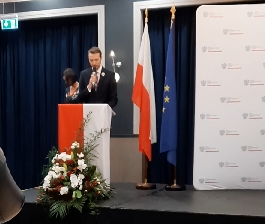This time, the Consul read from a note, wine flowed on the table, and the Koniczyna group danced on stage.
Independence Day is celebrated in Poland on November 11th. This year marks the 105th anniversary of Poland regaining independence after 123 years of partitions. The reception hosted by the Consul of the Republic of Poland in Dublin provided an opportunity for Polish community activists from various political and social backgrounds to come together. The hall was appropriately decorated for the occasion, featuring the Polish flag on stage and patriotic motifs.
Representatives of Polish organizations such as POSK, IPS, gorey.pl, Koniczyna, the renowned Rostra Solicitors law firm, activists, social workers, writers, editors, and members of election commissions from the recent parliamentary and senate elections attended the reception. All participants began by singing the Polish National Anthem. Subsequently, Ambassador Arkady Rzegocki addressed the gathering, followed by Consul Maciej Wójcik. As mentioned earlier, Consul Wójcik read from a note, which is entirely normal and even advisable for a coherent and factual speech.
social workers, writers, editors, and members of election commissions from the recent parliamentary and senate elections attended the reception. All participants began by singing the Polish National Anthem. Subsequently, Ambassador Arkady Rzegocki addressed the gathering, followed by Consul Maciej Wójcik. As mentioned earlier, Consul Wójcik read from a note, which is entirely normal and even advisable for a coherent and factual speech.
Later, children in folk costumes from the 'Koniczyna' ensemble took the stage, performing Polish dances. The talented Polish violinist Natalia Jaworek concluded the official program. In the informal part of the event, attendees enjoyed snacks and wine from the Polish winery Nizio Naturals. At one point, a glass of wine was accidentally knocked over, creating a pattern resembling the Polish flag on the white tablecloth. Of course, the staff promptly replaced the tablecloth, but this small incident may be one of the most memorable moments of the day.
On the way home, I noticed that the Samuel Beckett Bridge, which displays different motifs depending on the occasion, was illuminated in the colors of the Polish flag.
Poland has experienced both periods of strength and times under foreign rule. Its central location in Europe exposed it to frequent invasions from Germany, Russia, and Sweden.
Some significant historical events include:
- The baptism of Poland in 966 AD.
- The victorious Battle of Grunwald against the Teutonic Order, one of the largest battles in medieval Europe, which took place on July 15, 1410.
- The Swedish Deluge (1655-1660), during which Sweden invaded Poland, causing significant destruction and economic decline.
- The Battle of Vienna, led by Polish King Jan III Sobieski, which halted the Ottoman Empire's expansion into Central Europe. This battle occurred from September 12-15, 1683.
- The partitions of Poland in 1772, 1793, and 1795, during which Poland lost its independence and was under foreign rule until 1918. Despite several uprisings for independence during the partitions, they ended in failure.
- The Miracle on the Vistula in 1920, also known as the Battle of Warsaw, where the Polish counterattack forced the Bolsheviks to withdraw from Polish territory.
- World War II, which began with the fascist German invasion of Poland on September 1, 1939. After seven days of fighting, Poland surrendered due to a lack of ammunition and support. On September 17, 1939, the Soviet Union invaded Poland in accordance with the secret Ribbentrop-Molotov Pact.
- The political transformation in 1989. This year marked the end of communism in Poland and the transition to democratic social structures. In the years that followed, it became apparent that Poles gained the illusion of freedom and gradually lost sovereignty by signing various treaties with the European Union. Many Poles do not identify with the current authorities in Poland, considering them traitors to the Polish nation. There are still many members of parliament who were communist party activists before the political transformation.
Currently, the media in Poland is under the supervision of the ruling political faction or large corporations that shape the way people think in such a manner that they remain unaware of the globalists' plans to redirect the world towards modern slavery in the coming years. The book titled '1984' by George Orwell is likely serving as inspiration for managing people in a totalitarian manner.
